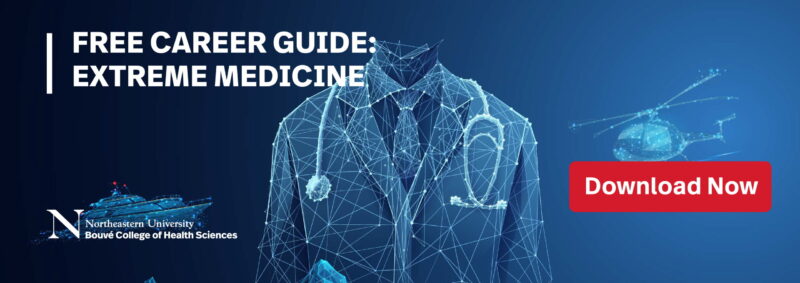Are you a medical professional looking to take your expertise to the next level? Enrolling in extreme medicine courses could be the beginning of an extraordinary career, whether your goal is to provide disaster relief around the world, care for patients in remote wilderness expeditions, or rescue the injured in demanding environments.
Traditionally, extreme medicine professionals have charted their own learning path by piecing together different types of fieldwork with continuing medical education (CME). However, specialized programs like Northeastern’s Graduate Certificate in Extreme Medicine allow you to dive deeper into the unique challenges and complexities of providing healthcare in remote, disaster-stricken, or austere environments.
If you’re interested in learning more, here’s an overview of what you can expect from structured extreme medicine courses and how they prepare you for success in the field.
5 Things to Expect in Extreme Medicine Graduate Courses
A formalized education can ease your path into the extreme medicine field, providing comprehensive coverage of the most crucial skills needed to start a career. From advanced medical techniques to survival best practices, the knowledge you gain in graduate programs can equip you with the confidence to manage the safety and well-being of individuals in extreme conditions.
Here are five things you can expect in graduate-level extreme medicine courses.
1. Specialized Coursework
Medics in extreme environments wear many hats, so they need a well-rounded skill set as a clinician, leader, and critical thinker. The goal of graduate-level extreme medicine courses is to train medical providers on advanced strategic perspectives, environment evaluations, as well as obstacle and resource assessments to help them formulate solutions in extreme situations.
For example, Northeastern’s curriculum includes coursework in a variety of disciplines. Here’s a closer look at the topics you can expect in Northeastern’s graduate-level program.
Human Factors and Situational Awareness
Medical providers need to understand the conditions they’re facing and any factors influencing health outcomes. Therefore, it’s important to think about the assessment of extreme situations and environments.
“What are some of the things that affect your team?” asks Stephen Wood, program director for the extreme medicine certificate program at Northeastern University’s Bouvé College of Health Sciences. “Be it sleep deprivation or mental health issues, and how do you recognize and address those kinds of problems and issues?”
Crisis Resource Management and Case Studies
When working in high-stress situations, skilled medics have to be able to optimize team performance, communication, and decision-making to mitigate risk and successfully navigate an emergency.
Northeastern’s crisis resource management courses take a closer look at this aspect of extreme medicine. “We cover the components of crisis resource management, with a focus on learning how to become a leader during a crisis,” says Wood.
Humanitarian Practice and Principles
Delivering ethical and compassionate medical care to individuals in disaster-affected regions requires cultural sensitivity and respect for human rights. In extreme environments, where resources may be limited and conditions are challenging, it’s still important to adhere to humanitarian principles ensuring the well-being and dignity of affected communities.
For example, Northeastern’s courses talk about the World Health Organization (WHO). “We talk about their structure, cultural competence, provision of care in humanitarian medicine, working with local governments and local medical care providers, as well as how they structure a team when responding to humanitarian crises,” says Wood.
Humanitarian Ethics
Ethical considerations should always guide a medical provider’s decision—even outside of conventional healthcare settings. As a result, Northeastern’s ethical coursework focuses on “the tenets of justice, equity, beneficence and non-maleficence, and to practice ethically in humanitarian care,” Wood explains. “So it’s really going to focus on being an ethical provider in these situations.”
At the same time, ethical best practices are relevant to any environment where providers are performing medical interventions. “The skill set that we are teaching extends to people who work in emergency medical services, or even in an ER or ICU.”
Developing a strong sense of integrity and a genuine desire to make an impact on those in need will serve graduates in every aspect of their career.
2. Quality Faculty
In a graduate-level program, you can expect guidance from faculty members who are seasoned practitioners in the field. High-quality instructors bring a wealth of academic knowledge and practical insight from working in diverse, extreme environments.
Since real-world experience informs everything you do in this complex domain of medicine, it’s essential to learn from professionals who have collectively encountered a wide range of extreme environments and situations. Northeastern’s Graduate Certificate in Extreme Medicine emphasizes faculty who are experts in both fieldwork and teaching.
“Anyone we’re bringing into our program to be an instructor not only has experience in the field, but also has experience as an educator,” Wood adds. “And I think that’s something that’s missing in a lot of education.”
As a result, faculty—like Northeastern’s—mentor and challenge students, nurturing your ability to make effective decisions in high-pressure scenarios.
3. In-Depth Practicums
Practicums provide opportunities to take the concepts you’ve learned and implement them in real-world environments. Not only does this allow for hands-on experience, but it also enhances preparedness. Through practicums, learners can develop critical skills in emergency response, patient care, and teamwork while working alongside experienced instructors.
Immersive experiences are also helpful for identifying strengths, interests, and areas for improvement, making it easier to tailor a career path in extreme medicine. Northeastern partners with World Extreme Medicine to offer operational experiential practicums in several specialties, including:
- Human Factors and Situational Awareness
- Cold Weather and Expedition Medicine
- Wilderness and Expedition Medicine
- Humanitarian Medicine
Although these optional courses aren’t part of the certificate, they can be taken for credit.
For students interested in continuing education and support as they enter the field, taking part in practicums comes with additional advantages. “World Extreme Medicine is also going to be offering a one-year membership to World Extreme Medicine as a benefit,” says Wood. “And that gives you their entire library of educational resources. So you’ll have access to the podcast, webinars, job listings, their educational programming discounts, and access to the annual World Extreme Medicine Conference.”
4. Structured Format
For flexible learning, Northeastern’s extreme medicine program offers an online asynchronous format. Students who need educational options they can balance alongside other commitments, such as work or family, will benefit from being able to learn on their own schedule.
At the same time, there are opportunities to connect with a global community of mentors and students to learn from their experiences. The asynchronous format comes with archived resources, giving students the opportunity to revisit course materials for deeper understanding and review.
However, if you decide to enroll in a practicum, courses will be in-person in immersive environments around the world.
5. Supportive Resources
While shorter, intensive programs in extreme medicine aren’t set up for robust student support, graduate-level online programs provide the traditional resources of a university.
“You’ll have access to all the support resources that any university student would get,” Wood adds. “So that would include anything from IT resources to mental health resources.” Academic support services, such as career counseling and networking, are also available to help you find the right employment after graduation.
Is an Extreme Medicine Course Right For You?
Deciding whether an extreme medicine course is right for you requires careful consideration of your passions, career goals, and personal attributes. If you thrive on challenges, have a spirit of adventure, and feel mentally and physically fit to work in austere environments, the world of extreme medicine can offer lifelong satisfaction and growth.
“Certainly there are going to be people who have a real interest in working in extreme environments,” Wood notes. “And some people have an interest in doing jungle medicine. The skills that we’re teaching are applicable well beyond that.”
Specialized programs provide targeted learning and structure to equip students with a strong foundation in expeditionary healthcare. Assess the curriculum and course offerings to ensure they cover the advanced skills and knowledge required in extreme environments. No matter what path you decide to take, Northeastern’s graduate program is designed to prepare you for emergency response in any environment, including conventional ones.
“While we think of ‘extreme’ as being these extreme environments, a lot of these principles actually are applicable well beyond the extreme environments and even in our daily lives,” says Wood. Some courses teach valuable skills applicable across industries, especially if you’re interested in leadership, global humanitarian aid, or public health policy.
“While many people are going to want to stretch their boundaries and work in those environments, there’s a lot to gain from just the crisis leadership course, human factors course, ethics course, and humanitarian principles in practice. The things you can learn from those extend well beyond just working in austere environments.”
Start Advancing Your Education in Extreme Medicine
Ultimately, an extreme medicine course can be the perfect fit for those seeking an adrenaline-filled career in healthcare and wish to apply their expertise in diverse and demanding settings in various sectors. In a graduate program, like the one offered at Northeastern, students can expect a rigorous curriculum, practical experiences, and valuable skill-building opportunities that equip them to make a difference in the lives of others.







Related Articles
4 Pressing Global Health Problems We Face Today
Global Health Careers: How Can I Make a Difference?
Compliance Specialists: Who They Are and What They Earn